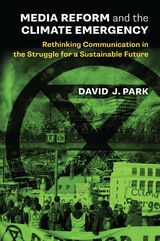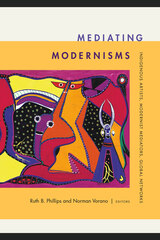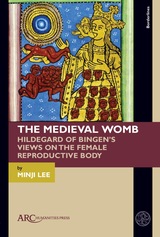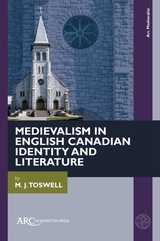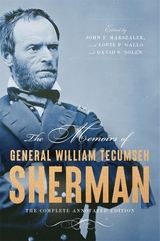4 books about Essay Film

Audiovisual Thinking and the Essay Film
The Case of Francophone Europe
Lourdes Monterrubio Ibáñez
Amsterdam University Press, 2025
From a semio-pragmatic perspective and drawing on an interdisciplinary and intermedial approach, this book analyses how the audiovisual thinking process manifests itself in essay films. It explores how issues of subjectivity and identity, whether individual, social, political or cultural, prompt thought through the medium of cinema.
The volume discusses the European Francophone essay film from its first appearance in cinematic modernity to the present. The study is developed in three stages. The first analyses the intermedial forms that are used: the letter, the (self-)portrait, the dialogue, the diptych, etc. The second examines the audiovisual materials that are mobilised. The third addresses the audiovisual procedures that are generated. In its analysis of works by Marker, Godard, Akerman, Varda and others, this book offers a new and detailed understanding of the production, evolution and achievements of the essay film in Francophone Europe.
The volume discusses the European Francophone essay film from its first appearance in cinematic modernity to the present. The study is developed in three stages. The first analyses the intermedial forms that are used: the letter, the (self-)portrait, the dialogue, the diptych, etc. The second examines the audiovisual materials that are mobilised. The third addresses the audiovisual procedures that are generated. In its analysis of works by Marker, Godard, Akerman, Varda and others, this book offers a new and detailed understanding of the production, evolution and achievements of the essay film in Francophone Europe.
[more]
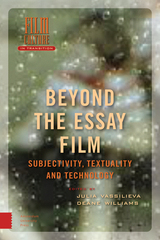
Beyond the Essay Film
Subjectivity, Textuality and Technology
Julia Vassilieva
Amsterdam University Press, 2020
In the wake of the explosion in the production of essay films over the last 25 years and its subsequent theorization in scholarly literature, this volume seeks to historicize these intertwined developments within the ‘long durée’ of the 20th century and into the 21st. By raising the issue of ‘beyond the essay film’, this collection seeks not only to acknowledge the influential predecessors of this — in the view of many critics, the most interesting type of contemporary filmmaking — but also to speculate about its possible transformation as we move forward into the uncharted waters of the 21st — digital — century. Beyond the Essay Film focusses on three specific axes that underpin and shape the articulation of the essay film as a specific cultural form — subjectivity, textuality, and technology — to explore how changes along and across these dimensions affect historical shifts within the essay-film practice and its relation to other types of cinema and neighbouring art forms.
[more]

Essay Film and Narrative Techniques
Screen-writing Non-fiction
Edited by Romana Turina and Kiki Tianqi Yu
Intellect Books, 2025
Bringing together filmmakers and scholars, this volume unpacks the evolving language of screenwriting in documentary and experimental cinema.
Uniting filmmakers and practice-led researchers, Essay Film and Narrative Techniques: Screen-writing Non-fiction explores the evolving language of essay film through various methods of narration, including production diaries, self-critiques, interviews, and theoretical analyses. Including canonical works and unconventional approaches, this collection emphasizes how essay films blur the lines between personal expression and collective storytelling.
In this volume, renowned scholars and practitioners unpack the conceptual and contextual dimensions of screenwriting for essay film, considering its role as both a cinematic and research tool. Whether reflecting on the personal camera or hybrid creative methodologies, the essays provide invaluable insights into how essay films are written and realized.
With its interdisciplinary scope and innovative approach, this work is a beneficial resource for academics, filmmakers, and students of documentary and experimental cinema, offering a nuanced understanding of how screenwriting shapes nonfiction storytelling.
Uniting filmmakers and practice-led researchers, Essay Film and Narrative Techniques: Screen-writing Non-fiction explores the evolving language of essay film through various methods of narration, including production diaries, self-critiques, interviews, and theoretical analyses. Including canonical works and unconventional approaches, this collection emphasizes how essay films blur the lines between personal expression and collective storytelling.
In this volume, renowned scholars and practitioners unpack the conceptual and contextual dimensions of screenwriting for essay film, considering its role as both a cinematic and research tool. Whether reflecting on the personal camera or hybrid creative methodologies, the essays provide invaluable insights into how essay films are written and realized.
With its interdisciplinary scope and innovative approach, this work is a beneficial resource for academics, filmmakers, and students of documentary and experimental cinema, offering a nuanced understanding of how screenwriting shapes nonfiction storytelling.
[more]
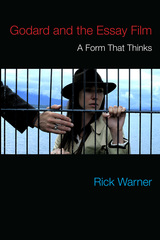
Godard and the Essay Film
A Form That Thinks
Rick Warner
Northwestern University Press, 2018
Godard and the Essay Film offers a history and analysis of the essay film, one of the most significant forms of intellectual filmmaking since the end of World War II. Warner incisively reconsiders the defining traits and legacies of this still-evolving genre through a groundbreaking examination of the vast and formidable oeuvre of Jean-Luc Godard.
The essay film has often been understood by scholars as an eccentric development within documentary, but Warner shows how an essayistic process of thinking can materialize just as potently within narrative fiction films, through self-critical investigations into the aesthetic, political, and philosophical resources of the medium. Studying examples by Godard and other directors, such as Orson Welles, Chris Marker, Agnès Varda, and Harun Farocki, Warner elaborates a fresh account of essayistic reflection that turns on the imaginative, constructive role of the viewer.
Through fine-grained analyses, this book contributes the most nuanced description yet of the relational interface between viewer and screen in the context of the essay film. Shedding new light on Godard’s work, from the 1960s to the 2010s, in film, television, video, and digital stereoscopy, Warner distills an understanding of essayistic cinema as a shared exercise of critical rumination and perceptual discovery.
The essay film has often been understood by scholars as an eccentric development within documentary, but Warner shows how an essayistic process of thinking can materialize just as potently within narrative fiction films, through self-critical investigations into the aesthetic, political, and philosophical resources of the medium. Studying examples by Godard and other directors, such as Orson Welles, Chris Marker, Agnès Varda, and Harun Farocki, Warner elaborates a fresh account of essayistic reflection that turns on the imaginative, constructive role of the viewer.
Through fine-grained analyses, this book contributes the most nuanced description yet of the relational interface between viewer and screen in the context of the essay film. Shedding new light on Godard’s work, from the 1960s to the 2010s, in film, television, video, and digital stereoscopy, Warner distills an understanding of essayistic cinema as a shared exercise of critical rumination and perceptual discovery.
[more]
READERS
Browse our collection.
PUBLISHERS
See BiblioVault's publisher services.
STUDENT SERVICES
Files for college accessibility offices.
UChicago Accessibility Resources
home | accessibility | search | about | contact us
BiblioVault ® 2001 - 2025
The University of Chicago Press


